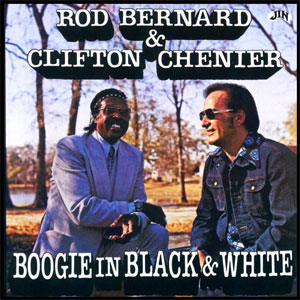A brief history…
Few artists can claim to have single-handedly invented a musical genre but Clifton Chenier comes very close. There were obviously antecedents to his style of music but it’s a good bet that if he had never come along zydeco would be very different—or possibly not exist at all. The undisputed “King of Zydeco” for over four decades, Clifton mixed Cajun and Creole French music with blues, R&B, and rock & roll, and virtually invented both the musical style as well as the name, “zydeco,” which is derived from a song he popularized, entitled “Les Haricots (phonetically Zydeco) Sont Pas Sales.” He is also credited with designing the modern rubboard ‘vest’ which is now used by most zydeco bands. Playing the accordion and singing, Clifton was a real showman on-stage; smiling, he displayed a shiny gold tooth, and he often wore a cape and crown during his performances. Playing with his Red Hot Louisiana Band, which featured brother Cleveland, tenor sax player Blind John Hart, and guitarist Paul Senegal, Chenier helped popularize zydeco in America and Europe.
Born in Louisiana to sharecropper parents in 1925, Chenier was taught to play the accordion by his father. He was influenced by the recordings of Creole accordionist, Amedee Ardoin but also added elements of R&B, country, rock ‘n’ roll and swing to his two-steps and waltzes to his Louisiana musical heritage to come up with his own unique sound. Clifton was a prolific composer and wrote many songs that are now standards of the genre, including “Tu Le Ton Son Ton,” “I’m Coming Home,” “Zydeco Cha Cha,” “Johnny Can’t Dance,” “I’m A Hog for You,” “Zydeco Sont Pas Sale” and “Hot Tamale Baby.” Chenier began suffering from diabetes and slowed his touring pace in the late 1970s.
Clifton Chenier passed away in 1987.
Reviews…
The Advertiser (September 2014)
BOOGIE IN BLACK & WHITE
An album titled “Boogie in Black & White” barely raises an eyebrow today in south Louisiana.
But the story was much different story in 1976. Elementary and high schools in the state had just been reluctantly integrated six years earlier.
Yet white singer Rod Bernard had a dream. Bernard was already known throughout the area as a TV celebrity and swamp pop singer. He had even hit the Billboard Top 20 and performed on national TV with his 1959 hit, “This Should Go On Forever.”
But Bernard longed to record with a black musician who shared his same hometown of Opelousas — Clifton Chenier.
“This recording is the final result of an idea I’ve had for many years: to record an album with the ‘Zydeco King,’ Clifton Chenier!,” Bernard wrote in 1976. “You see, I was raised on boogie and blues. My all-time favorites are Fats Domino, B. B. King, Chuck Berry, Jimmy Reed, and, of course …Clifton Chenier.”
Bernard’s words, and the landmark album that carried them, have returned almost 40 years later. Jin Records of Ville Platte has re-released “Boogie in Black & White” on CD.
The disc contains the same 10 songs from the original recording, along with new, more extensive liner notes written by Rod’s son, historian Shane Bernard of New Iberia.
In the late 1970s, “Boogie” became a hit for its hard-driving, accordion-flavored version of R&B and blues classics. It featured a racially-integrated band with some of the region’s most popular musicians.
Chenier, who was already touring internationally with his Red Hot Louisiana Band, brought in two bandmates, his brother Cleveland on rubboard and saxophone ace John Hart. Singer and drummer Warren Storm, known for his 1958 national hit, “Prisoner’s Song,” provided the beat. Glenn Himel (piano), James Stelly (guitar) and Joe Hill (bass) rounded out the ensemble.
“The idea was simple,” wrote Bernard in the notes. “Pick ten ‘boogie’ songs, add Clifton’s unique accordion sound, throw in Cleveland’s scrubboard, let Warren set the beat and try to sing like hell!”
The musicians gathered at Floyd Soileau’s Jin Studio in Ville Platte and ripped through “Kansas City, “Shake Rattle & Roll,” “True Fine Mama” and other early R&B and rock ‘n’ roll nuggets. In an interview, Soileau said reaction was strong at home and away.
“That was the album we had the best sales in the east Texas area,” said Soileau. “I guess because Clifton was so popular in east Texas and the Houston area. We probably sold more there than in Louisiana.
“We must have had some stations over there playing it that I didn’t know about and it created some demand. They liked those R&B hits with that zydeco style. It was just the right time and the right place. It turned out to be a great success.”
Praise came from as far as England. British music writer Bill Millar called the record “a wild and wooly rock ‘n’ roll set with spontaneity one normally only dreams about.” Baltimore music writer Larry Benicewicz suggested the album planted the seed for Wayne Toups’ “zydecajun” style and Zachary Richard’s 1984 “Zack Attack” album.
Soileau is thrilled to see “Boogie” back for a new generation to enjoy.
“It was always in the back of my mind that we needed to do a digital version of that. I kept telling my son Chris and he said, ‘We got it on the list.’
“There was always something pushing back and I said ‘It’s past time. I want to see this in digital form before you put me six feet under.’
“I hope the folks will get a hard copy that they can show and present to the younger generation as a remembrance of this music. It was so hot back then. We have to pass that on to future generations.”
by Herman Fuselier
Related links…

